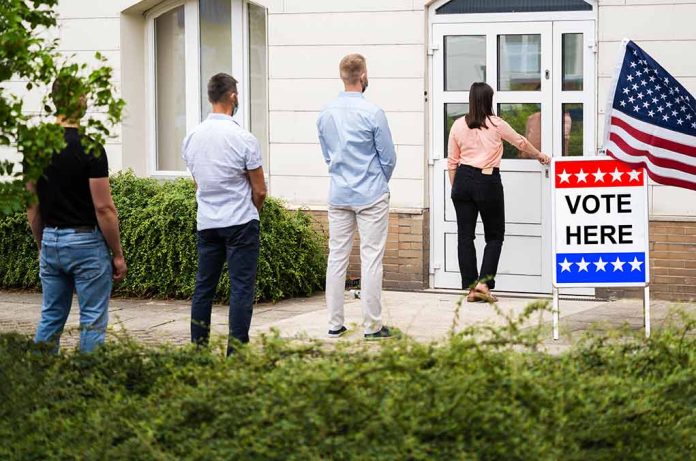
Christian voter apathy threatens to derail Republican election strategy, new study warns.
At a Glance
- Arizona Christian University study reveals potential drop in Christian voter turnout
- Two-thirds of Americans identify as Christian, with 55% being “practicing Christians”
- Practicing Christians tend to vote more frequently and often align with conservative positions
- Declining Christian voter participation could pose a significant challenge for Republicans
- White evangelical politics is predominantly associated with older, conservative voters in the South
Christian Voters: A Crucial Demographic in American Politics
The landscape of American politics is deeply intertwined with religious affiliations, particularly Christianity. A recent study from Arizona Christian University’s Cultural Research Center has sent shockwaves through Republican circles, highlighting a potential decline in Christian voter turnout that could significantly impact the party’s electoral strategy. With two-thirds of Americans identifying as Christian and 55% being “practicing Christians,” this demographic has long been a cornerstone of conservative political support.
Practicing Christians have historically shown higher voter turnout rates compared to other eligible voters, often aligning themselves with conservative positions. This trend has given them an outsized influence on election outcomes, frequently benefiting Republican candidates. However, the study suggests that many American Christians, including born-again individuals and regular churchgoers, might opt out of participating in the next presidential election, posing a strategic obstacle for the Republican Party.
The Changing Face of Christian Politics
The relationship between Christianity and political affiliation in the United States has evolved significantly over the decades. The link between religion, race, and voting patterns has intensified since the 1960s, shaped by historical social changes and movements. White evangelical politics, in particular, has become predominantly associated with older, conservative voters, especially in the South, who are inclined towards the Republican Party and former President Donald Trump.
“No president has ever fought for Christians as hard as I have,” – Donald Trump
This bold claim by Trump underscores the complex relationship between the Republican Party and Christian voters. While Trump has undeniably courted and rewarded white evangelicals with policies such as the appointment of conservative Supreme Court justices who overturned Roe v. Wade, the potential decline in Christian voter turnout suggests that this strategy may be losing its effectiveness.
Generational Shift and Demographic Changes
The decline of white Christians in America is not solely due to voter apathy. It’s part of a broader trend driven by the rise of religiously unaffiliated Americans and increasing racial diversity. Younger generations, including younger white evangelicals, are becoming more progressive on social issues, though they remain conservative on abortion. This generational shift poses a significant challenge for the Republican Party, which has long relied on the support of older, more conservative Christian voters.
Despite the decline in their share of the population, white evangelicals remain a significant voting bloc, constituting about 30% of Republican identifiers and 14% of the electorate. Their influence is particularly pronounced in Republican primaries, especially in states like Iowa. This reality complicates the GOP’s stance on issues like abortion and forces the party to navigate a delicate balance between appealing to its traditional base and attracting younger, more diverse voters.
The Trump Factor and Future Republican Strategy
Trump’s appeal to white evangelicals is based more on shared cultural battles and anger rather than shared faith, making him a dominant figure on the religious right. However, with the potential decline in Christian voter turnout, the Republican Party may need to rethink its outreach and engagement strategies. The party faces the challenge of maintaining its traditional Christian base while also appealing to a changing electorate.
As we approach the 2024 election, the role of Christianity in American politics remains significant, but it’s evolving. The Republican Party must navigate these changes carefully, balancing the needs and desires of its traditional Christian base with the realities of a changing demographic landscape. The outcome of this balancing act could well determine the party’s success in future elections.






















